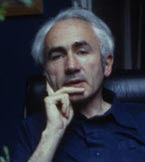Noted authors
Keki N. Daruwalla and
Amit Chaudhuri are among the four Indians nominated for the Commonwealth Writers' Prize 2010. Besides Daruwalla's
For Pepper and Christ and Chaudhuri's
The Immortals, authors Rana Dasgupta and Chandrahas Chowdhury have also been nominated for their books
Solo and
Arzee the Dwarf, respectively.
While
Solo and
Arzee The Dwarf have been published by HarperCollins-India,
For Pepper and Christ has been published by Penguin-Books India and
The Immortals has been published by Picador-India.
For Pepper and Christ is a historic tale of sailors voyaging during the time of Vasco Da Gama that weaves itself around the legend of Prestor John and spice trade.
The Immortals is the story of two families in Mumbai of the 'eighties bound by music.
Other nominees for best book in Europe and South Asia include
The Beijing of Possibilities by Jonathan Tel (Britian),
Heartland by Anthony Catwright (Britain)
In Other Rooms, Other Wonders by Daniyal Mueenuddin (Pakistan) and
Another Gulmohar Tree by Aamer Hussain (Pakistan), a communique issued by HarperCollins said on Friday.
Full report
here Little About
-=-=-=-=-
The regional winners shortlisted are:
Africa
The shortlisted writers for Africa's
Best Book are:
Trespass by Dawn Garisch (South Africa)
The Double Crown by Marié Heese (South Africa)
The Thing Around Your Neck by Chimamanda Ngozi Adichie (Nigeria)
Eyo by Abidemi Sanusi (Nigeria)
Tsamma Season by Rosemund Handler (South Africa)
Refuge by Andrew Brown (South Africa)
Kings of the Water by Mark Behr (South Africa)
The shortlisted writers for Africa's
Best First Book are:
I Do Not Come to You by Chance by Adaobi Tricia Nwaubani (Nigeria
The Shape of Him by Gill Schierhout (South Africa)
The Shadow of a Smile by Kachi Ozumba (Nigeria)
Come Sunday by Isla Morley (South Africa)
Sleepers Wake by Alistair Morgan (South Africa)
Jelly Dog Days by Erica Emdon (South Africa)
Harmattan Rain by Aysha Harunna Attah (Ghana)
Caribbean and Canada
The shortlisted writers or the Caribbean and Canada
Best Book are:
The Winter Vault by Anne Michaels (Canada)
February by Lisa Moore (Canada)
Euphoria by Connie Gault (Canada)
Goya's Dog by Damian Tarnopolsky (Canada)
Galore by Michael Crummey (Canada)
The Golden Mean by Annabel Lyon (Canada)
The shortlisted writers for the Caribbean and Canada
Best First Book are:
Under this Unbroken Sky by Shandi Mitchell (Canada)
Daniel O'Thunder by Ian Weir (Canada)
The Island Quintet: Five Stories by Raymond Ramchartiar (Trinidad)
Diary of Interrupted Days by Dragan Todorovic (Canada)
The Briss by Michael Tregebov (Canada)
Amphibian by Carla Gunn (Canada)
South Asia and Europe
The shortlisted writers for South Asia and Europe
Best Book are:
Solo by Rana Dasgupta (Britain)
For Pepper and Christ: A Novel by Keki Daruwalla (India)
The Beijing of Possibilities by Jonathan Tel (Britain)
Heartland by Anthony Catwright (Britain)
Another Gulmohar Tree by Aamer Hussein (Pakistan)
The Immortals by Amit Chaudhuri (India)
The shortlisted writers for South Asia and Europe
Best First Book are:
The Hungry Ghosts by Anne Berry (Britain)
Arzee the Dwarf by Chandrahas Choudhury (India)
In Other Rooms, Other Wonders by Daniyal Mueenuddin (Pakistan)
Among Thieves by Mez Packer (Britain)
An Equal Stillness by Francesca Kay (Britain)
Tail of the Blue Bird by Nii Parkes (Britain)
South East Asia and Pacific
The shortlisted writers for South East Asia and Pacific
Best Book are:
Summertime by J.M Coetzee (Australia)
A Good Land by Nada Awar Jarrar (Australia)
The Adventures of Vela by Albert Wendt (Samoa)
Singularity by Charlotte Grimshaw (New Zealand)
The People's Train by Thomas Keneally (Australia)
Parrot and Oliver in America by Peter Carey (Australia)
The shortlisted writers for South East Asia and Pacific
Best First Book are:
The Ice Age by Kirsten Reed (Australia)
After the fire, a still small voice by Evie Wyld (Australia)
Look Who's Morphing by Tom Cho (Australia)
Document Z by Andrew Croome (Australia)
Come Inside by Glenys Osborne (Australia)
Siddon Rock by Glenda Guest (Australia)








